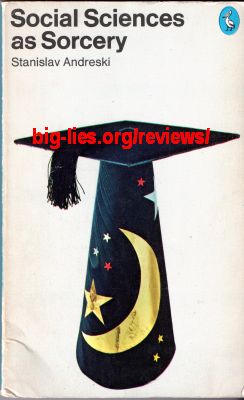Review of Rare genre—Critical Attack on 'Social Sciences' Stanislav Andreski: Social Sciences as Sorcery (1970s)

I suspect Andreski was not a Pole, but a Jew. Either way, as far as I know he wrote nothing on Jews, and therefore must be regarded as partly phoney. He must have been persuasive and convincing; he had for example an entry in A Dictionary of the Social Sciences of 1964: Totalitarianism is the extension of permanent governmental control over the totality of social life. A movement or an ideology may be called totalitarian if it advocates such an extension.
Andreski's book Social Sciences as Sorcery has publication dates quoted as 1971 to 1974. According to my 1973 Pelican paperback, Social Sciences and Sorcery was published first by Andre Deutsch, a Jewish publisher of general titles. St Martins Press—the publisher that in the 1990s withdrew its offer to publish Irving on Goebbels—was Andreski's US publisher. My copy is a blue-backed Pelican paperback with a silly wizard-style hat cover picture. I think Andreski may have been treated in similar vein to the 'existentialist psychiatrist' R D Laing, but never achieved widespread fame, no doubt because there were and are huge Jewish controlling forces in the academic world, which have had catastrophically disastrous effects. I head about Andreski from Harold Hillman, who was about the same age, and who tried to collect examples of critical thinkers in the academic world, in the hope they might collaborate.
He wrote in a more literary way than is usual in sociology—probably his book was sparked by Talcott Parsons, an absurd figure, possibly a non-Jew front-man puppet, of the Margaret Mead type, it occurs to me. Andreski's book unfortunately doesn't approach being exhaustive, which might have removed the feeling that after all there may be useful stuff lurking in sociology. The book is unindexed, a piece of very unfortunate laziness.
Here's a small sample of his style: ... do not be impressed unduly by titles or positions. Top universities can usually get the best people in the fields where there are firm criteria of achievement; but at the present stage of development of the social sciences the process of selection resembles, as often as not, a singing competition before a deaf jury who can judge the competitors only by how wide they open their mouths. This is amusing, but his book is weakened by poor typesetting: there's little signposting, so that good passages are hard to relocate; and he switches between general comment, specific topic material, and authors, in a tiring way. It's the the type of book in recommended reading lists, and tucked away in bibliographies, but not referred to in detail.
There are reviews online, which, as might be expected in the early 1970s when Jewish policy was devoted to making money from the Vietnam War, are worthless. www.scholar.google.com gives some hint at the small scale micro-turmoil he caused. I'm unsure if the book can be downloaded; the unpleasant US habit of concealing contractual details until the last minute comes into play at present.
The chapter headings (I've labelled the three longest, possibly most detailed, and may write about them) are:-
1 Why Foul One's Nest? / 2 The Witch Doctor's Dilemma / 3 Manipulation Through Description / 4 Censorship Through Mass Production / 5 In the Footsteps of Monsieur Pangloss and Dr. Bowdler / 6 The Smoke Screen of Jargon [LONG] / 7 The Uses of Absurdity / 8 Evasion in the Guise of Objectivity / 9 Hiding Behind Methodology / 10 Quantification as Camouflage [LONG] / 11 Promiscuous Crypto-Conservatism / 12 Ideology Underneath Terminology [LONG] / 13 Techno-Totemism and Creeping Crypto-Totalitarianism / 14 The Law of Lighter Weights Rising to the Top [in US funding] / 15 Gresham's and Parkinson's Laws Combined / 16 Ivory Towers or Bureaucratic Treadmills /17 The Barbarian Assault on the Corrupted Citadels of Learning / 18 Conclusion: Ethics and the Advancement of Knowledge
From which his literary leanings (both old and new) are obvious enough. There are a few problems:
[1] As I've described, his book is rather pathless and homogenous, where homogeneity is not helpful.
[2] Andreski puzzles over determinism, and has passages where claims about predictions aren't reliable.
[3] What's worst is his failure to discuss Jews, which is inexcusable in a Pole, and inexcusable in a Jew living in Poland. Somewhere, Andreski says any intelligent black-coated worker (i.e. a 'suit') knows enough about his society that sociologists can say noting much new to him; and he defends anthropologists on the grounds that they should say something new about e.g. north Africans.
[4] There are mistakes which should have been caught, for example his Hume 'quotation' ‘Reason is, and must always remain, the slave of the passions’ appears to be wrong. My notes say there are some misspellings, e.g. J R Robertson. Andreski of course accepts the Holohoax, despite being well-travelled, and familiar with Poland. He mentions, though, Americans burning villages in Vietnam. (This latter may be the reason that stupid critics of Andreski call him 'Marxist'.)
Andreski makes numerous interesting comments: Evidence that psychology and sociology don't work (p 27 Pelican edn), 'theory of games and US foreign policy'—naturally a waste of time, p.126, 'cybernetic' models (pp 185 ff), p 108 the meaning of the word "fascist", much the same in 2017 as 1974, easily explained now as a result of Jewish lies. Freud, Marx, Levi-Strauss but also Jewish sociologists like Durkheim. And Comte, Herbert Spencer.
Some people will find this book interesting. Perhaps some revisionist type will rearrange it to take account of Jews, add some updates, improve the layout, or incorporate parts of it into a better attack on money-making timid Jew puppets. I hope so, anyway.
RW 3 Dec 2017
|